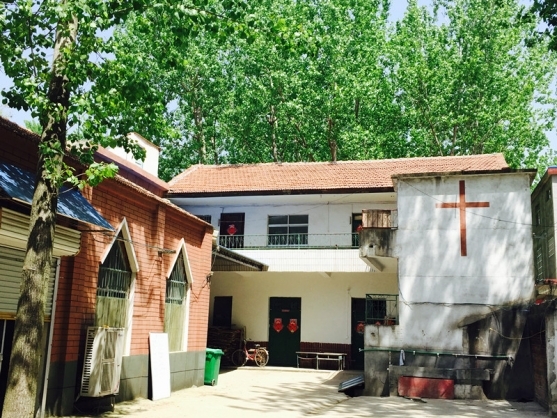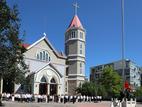Churches in the countryside are referred to as “rural” because of where they are located. When we hear about the rural church, we have a subjective bias. We think that rural churches are poor, have a small number of people, insufficient material resources, and a scarcity of preachers. However, in recent years as rural areas have developed, churches have increased in number, have improved their quality, changed the way in which they meet, and have developed further ministries. Here we want to carefully analyze the changes that rural churches have made from the past to the present.
I. The Transformation of the Meeting Program and Mode
In connection with modern progress, rural churches have gradually become orderly. Church administration and structure as well as the hardware and software of the churches all have improved greatly. Originally rural churches held worship services in the houses of some brothers and sisters. Men and women, young and old, met in this way. Church meetings included learning hymns, prayer, preaching, and then praying for each other at the end of the service.
Today's rural churches have changed greatly. First of all, there are large gathering places, different teachers for different groups, and excellent choirs and bands with keyboards, drums, guitars and other musical instruments. The order of service has also changed and gradually improved. Churches have various departments and ministries, and the number of preachers has also increased. Every Sunday service, there is a list for preachers who take turns preaching. Rural churches have learned to follow the worship order of urban churches in China and Western churches. Services begin with an introduction and welcome, followed by scripture reading, songs from the choir accompanied by musical instruments. At the end of the service the person in charge summarizes the meeting and reports on the concerns of families in the church, followed by a sharing of testimonies.
Rural churches are gradually changing with the needs of the times, striving to improve on their shortcomings and deficiencies. Originally, everything in rural churches was run by a single preacher. He/she was responsible for teaching hymns, leading worship, praying and preaching. But now there is a designated person in charge of each step of the worship service.
The model of how the church is structured and operates is in line with the development of the times. Under the principle of not violating the truth, it has been necessary to see the church develop a new model. People who gather for worship are diverse. Even new believers who want to serve in the church have the opportunity to understand the operation of the church, listen to testimonies, understand the Christian faith, and accept the Gospel.
II. Exploring New Fields
In recent years, rural churches have also made efforts to expand into cities and set up gospel classes to help young people learn about the Christian faith so that they can become a light within their setting.
In addition to gospel classes, there are also dance classes, which are opportunities for believers to reach out to the society and spread God's love.
Of course, in addition to the liturgical dance classes, the church is also developing its cultural mission. The cultural mission of Christians is to do what we can to help people in need, such as visiting nursing homes and orphanages, and being involved in public welfare activities like cleaning the city, joining volunteer teams, and bringing warmth and love to society.
Although the rural church may seem like it is backward, it is not. Rural churches also see the social needs of the times, and have an altruistic spirit of dedication. I learned some time ago that believers in some rural churches are also learning how to do first aid, including cardiopulmonary resuscitation and the dressing of wounds.
III. The Cultivation of the Next Generation of Preachers
Rural churches are also paying attention to developing the next generation of preachers, with the purpose of providing qualified successors. Although some of the rural churches have a serious problem with aging staff, God has always left seeds for the church. In the present rural churches, some excellent young people are increasingly showing up and are willing to join the building of local churches. So they go to seminary for further study and equip themselves with faith in God.
When it comes to developing the next generation of preachers, there are some advantages and some disadvantages. The advantages are that some people are willing to commit themselves, and that the church has new members. The disadvantage is that most of the young believers are the children of some church leaders, fellow workers and deacons, and few young believers are the children of ordinary believers.
Why is this happening? Perhaps the believers themselves pay little attention to the cultivation of their children's faith, so they do not have the habit of participating in the church fellowship. Or it may be personal opinions and prejudices, or it may be that it’s hard for today's young people to be brought into the church and serve. To sum up, training the next generation of preachers has become the challenge of the church in this age. Rural and city churches are all facing such problems, because the social environment and cultural trends influence hearts that are of this age. Many people are unwilling to become preachers because it's too hard. One has to give up many things.
Rural churches train the next generation of preachers not only to continue and develop the church, but also to spread the Gospel. Therefore, the rise of the next generation of preachers is not only the responsibility of ministers, elders and deacons, but also the responsibility of every believer. The baton needs to be passed on to the next generation. It is the baton of the Church of God, the spread of the Gospel of God, and more directly related to the glory of God.
The development of the church cannot be separated from the guidance of God himself, and the future path cannot be separated from the revelation of the Holy Spirit.
- Translated by Nicolas Cao










